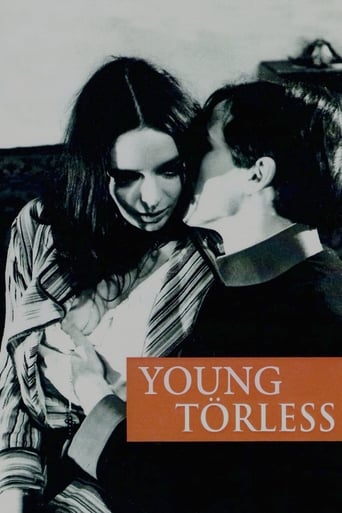

Disturbing yet enthralling
... View MoreWatch something else. There are very few redeeming qualities to this film.
... View MoreThe film makes a home in your brain and the only cure is to see it again.
... View MoreThis is a dark and sometimes deeply uncomfortable drama
... View MoreI selected this DVD off a library shelf at random. I had never heard of Young Torless. My idle curiosity was well rewarded. The film belongs in the same league with Loneliness of the Long Distance Runner, Zero for Conduct, Lord of the Flies, or other similar works. Perhaps there is allegory here, a foreshadowing of the murderous future of the Germanic peoples. Or maybe a nearer, smaller-scale atrocity: several scenes are as chilling as eavesdropping on a Leopold and Loeb strategy session.This is expertly crafted film making. Everything – casting, shot composition, editing, plot structure – works. Barbara Steele landed one of the great roles of her career. The music is especially effective. Hans Werner Henze's use of modern tonalities played on ancient instruments functions perfectly, achieving the film score ideal that complements the picture and other sounds, a Greek chorus without words. Aided by Henze's score, some of the scenes in Young Torless brought back with painful clarity many a sad, bleak, cloudy-morning memory of sophomore year in high school.
... View More1. It's been said here that the gay content of the story has been removed. Well, the novel was released in 1905. We can nowadays interpret elements of the story in a gay context, but back then these notions did not exist. If Schlöndorff hints at homosexuality as an element of perversion, that is in fact faithful to the novel, which takes a strictly observatory, non-participating stance.2. 'Törless' is often interpreted as an indicator of upcoming intolerance and Nazidom. Again, the novel was released at a much too early time to allow for such an interpretation; the novel's author Robert Musil certainly envisioned the inevitable fall of an empire stuck to tradition and incapable of accommodating personal liberties. Schlöndorff pushes some of the juvenile delinquents into similarities with the Nazis - albeit being carefully ambiguous about it -, but it would be wrong to consider this interpretation as a part of the original narrative.3. 'Törless' is a highly psychological tale and film - again, Schlöndorff proves faithful to the novel in this respect. But this comes with the weakness of constructing characters around a certain social concept. It would be misleading to consider Törless and his rebellious friends as typical representatives of their era, or real figures upon which the author based his characters. As may be more obvious in Musil's masterpiece, 'The Man without Qualities', his characters are crafted to evoke rather a situation than a person; that makes his books almost impossible to adapt correctly.Schlöndorff's film is somewhat middlebrow; it does not intend to be a substitute for reading the novel, but at the same time it carefully avoids to give the impression that it is anything but a rendition of it. That's not quite true; the interpretation is in the framing, the omissions of the subtext, and that the ideas upon watching the film differ considerably from those you get when you read the novel. One may call it therefore a failure - but an interesting failure to watch.
... View MoreThe idea of writing a story about a boarding school where bullies humiliate and torture weaker classmates is interesting and well worth making into a film, so I was interested in seeing this German film. However, the main character, Törless, was so confusing and inconsistent that it really damaged the overall impact. During much of the film, this lad seemed to be almost sleepwalking through the film. Many times, he just stared or watched but said or did almost nothing. Then, other times, he unexpectedly participated in some of the humiliation of his classmate. And, at another time, he was totally disconnected and observed the beatings and humiliations like a cold and clinical character reminiscent of a character from a Camus novel. Then, towards the end he announced that the torment was wrong and he tried to get the young man who was being physically, emotionally and sexually abused to come forward. As a result of this exceptionally poorly written character, so much of the impact of the film is missing. This is definitely a case of "what might have been". Oh, and speaking of 'sexually abused', this whole VERY IMPORTANT part of the story is poorly handled--being vaguely alluded to and then minimized. I would think a person being raped and sodomized might be a bit deal, but in this film it didn't seem that way at all.
... View MoreFaithfully adapted from author Robert Musil, this study of sadism and masochism among students at an Austro-Hungarian boys prep school is a parable of fascism and its origins. Barbara Steele is radiant and splendid as Bozena the prostitute who awakens the nascent sexual nature of the adolescent students. Lovingly photographed in black and white, YOUNG TORLESS evokes the mood and claustrophobic horror of the dehumanizing military system. Matthew Carriere gives an unblemished and heartfelt performance as an innocent caught behind the barbed wire walls of his very soul and the duty to which he has been placed. A must-see for everyone and an advocacy for pacificism. This was Volker Schloendorff's first film, and by admission one of Barbara Steele's favorite roles.
... View More